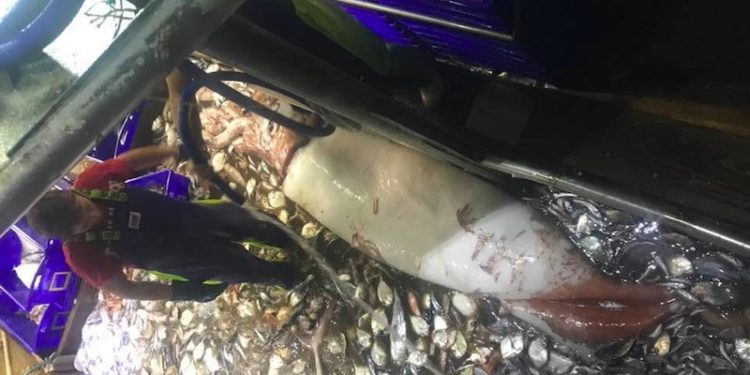Fishing in 380 metres of water off the west coast of Tasmania, skipper Alec Harvey of the Empress Pearl could hardly believe his eyes when an enormous squid landed on the deck – the biggest he had ever seen and estimated at 2.5-3.0 metres long and weighing 80-100kgs.
Once the crew had taken a few pictures, the squid went back over the side – and it was only later that they found out that in 2005, the Melbourne Aquarium had paid A$100,000 for the intact body of a 7 metre giant squid, preserved in a giant block of ice, which had been caught by fishermen off the coast of New Zealand’s South Island that year.
Based mostly on its size Dr Julian Finn from the Melbourne Museum has tentatively identified Empress Pearl’s squid as being a giant squid Architeuthis dux.
There is some debate about whether different species of giant squid exist within the genus Architeuthis with some literature reporting eight species and some only a single species. Some reports say that Empress Pearl’s squid was a tiddler with the maximum size reported at 14 metres long. Claims of 20 metre squid have not been scientifically documented.
Squid are a cephalopod and are propelled by pulling water into the mantle cavity, and pushing it out through a siphon, in gentle, rhythmic pulses. They can also move quickly by expanding the cavity to fill it with water, then contracting muscles to jet water through the siphon.
Giant squid breathe using two large gills inside the mantle cavity. The circulatory system is closed, which is a distinct characteristic of cephalopods. Like other squid, they contain dark ink used to deter predators.
They have sophisticated nervous systems and a complex brain. The giant squid has the largest eyes of any living creature and can be up to 27cm in diameter.
Giant squid feed on deepsea fish and other squids. They catch prey using the two tentacles, gripping it with serrated sucker rings on the ends. Then they bring it toward the powerful beak, and shred it with the radula (a tongue with small, file-like teeth) before swallowing it. They are believed to be solitary hunters, as only individual giant squid have been caught in fishing nets.









